
Maria do Carmo Miranda da Cunha, known professionally as Carmen Miranda, was a Portuguese-born Brazilian singer, dancer, and actress. Nicknamed "The Brazilian Bombshell", she was known for her signature fruit hat outfit that she wore in her American films.

Saludos Amigos is a 1942 American live-action/animated propaganda anthology film produced by Walt Disney and released by RKO Radio Pictures. Set in Latin America, it is made up of four different segments; Donald Duck stars in two of them and Goofy stars in one. It also features the first appearance of José Carioca, the malandro Brazilian parrot. Saludos Amigos premiered in Rio de Janeiro on August 24, 1942. It was released in the United States on February 6, 1943.

The Three Caballeros is a 1944 American live-action and animated musical propaganda anthology film produced by Walt Disney and released by RKO Radio Pictures. The film premiered in Mexico City on December 21, 1944. It was released in the United States on February 3, 1945 and in the United Kingdom in March 1945. It marks the tenth anniversary of Donald Duck and plots an adventure through parts of Latin America, combining live-action and animation. This is the second of the six package films released by Walt Disney Productions in the 1940s, following Saludos Amigos (1942). It is also notable for being one of the first feature-length films to incorporate traditional animation with live-action actors.

Stefan Zweig was an Austrian writer. At the height of his literary career, in the 1920s and 1930s, he was one of the most widely translated and popular writers in the world.
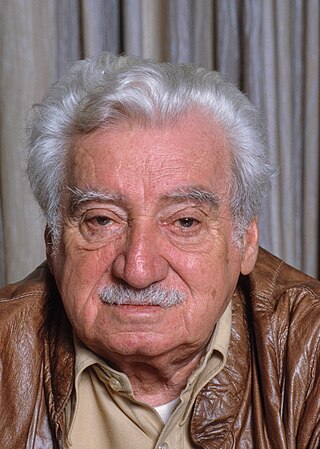
Jorge Amado was a Brazilian writer of the modernist school. He remains the best-known of modern Brazilian writers, with his work having been translated into some 49 languages and popularized in film, including Dona Flor and Her Two Husbands in 1976. His work reflects the image of a Mestiço Brazil and is marked by religious syncretism. He depicted a cheerful and optimistic country that was beset, at the same time, with deep social and economic differences.
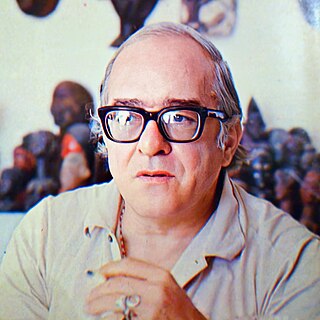
Marcus Vinícius da Cruz e Mello Moraes, better known as Vinícius de Moraes and nicknamed O Poetinha, was a Brazilian poet, diplomat, lyricist, essayist, musician, singer, and playwright. With his frequent and diverse musical partners, including Antônio Carlos Jobim, his lyrics and compositions were instrumental in the birth and introduction to the world of bossa nova music. He recorded numerous albums, many in collaboration with noted artists, and also served as a successful Brazilian career diplomat.

Florinda Bolkan is a retired Brazilian actress and model.

It's All True is an unfinished Orson Welles feature film comprising three stories about Latin America. "My Friend Bonito" was supervised by Welles and directed by Norman Foster in Mexico in 1941. "Carnaval" and "Jangadeiros" were directed by Welles in Brazil in 1942. It was to have been Welles's third film for RKO Radio Pictures, after Citizen Kane (1941) and The Magnificent Ambersons (1942). The project was a co-production of RKO and the Office of the Coordinator of Inter-American Affairs that was later terminated by RKO.

Alberto de Almeida Cavalcanti was a Brazilian-born film director and producer. He was often credited under the single name "Cavalcanti".
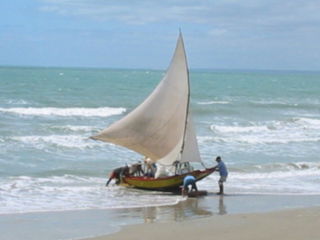
A jangada is a traditional fishing boat made of wood used in the northern region of Brazil.
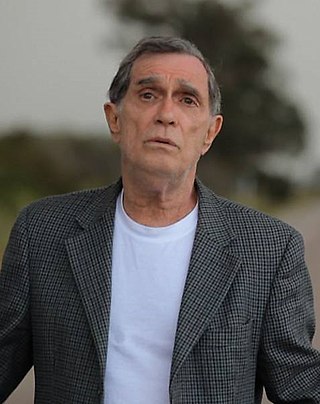
Henrique George Mautner, better known by his stage name Jorge Mautner, is a Brazilian singer-songwriter, lyricist, violinist, actor, screenwriter, film director and poet, considered to be a pioneer of the MPB scene and of the Tropicalista movement.
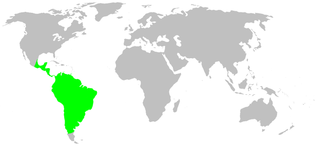
Senoculus is a genus of araneomorph spiders in the family Senoculidae, and was first described by Władysław Taczanowski in 1872. It is the only genus in the family Senoculidae.

José Domingos de Morais, better known as Dominguinhos, was a Brazilian composer, accordionist and singer. His principal musical influences were the music of Luiz Gonzaga, Forró and in general the music of the Sertão in the Brazilian Northeast. He further developed this typical Brazilian musical style, born out of the European, African and Indian influences in north-eastern Brazil, creating a unique style of Brazilian Popular Music.
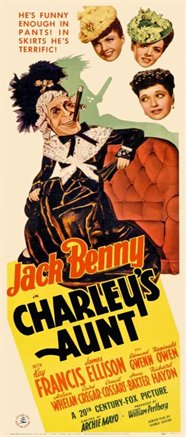
Charley's Aunt is a 1941 American historical comedy film directed by Archie Mayo. It stars Jack Benny and Kay Francis. It was the fourth American filmed version of the 1892 stage farce of the same name by Brandon Thomas. It remained one of Benny's personal favourites among his own films.

The Cinemateca Brasileira is the institution responsible for preserving Brazilian audiovisual production. In July 2021, it experienced a major fire.

Elisabeth Maria Silva de Faria known professionally as Betty Faria is a Brazilian actress.

Events in the year 1941 in Brazil.

It's All True: Based on an Unfinished Film by Orson Welles is a 1993 documentary film about Orson Welles's ill-fated Pan-American anthology film It's All True, shot in 1941–42 but never completed. Written and directed by Richard Wilson, Bill Krohn and Myron Meisel, the film is narrated by Miguel Ferrer. It was named the year's Best Non-Fiction Film by the Los Angeles Film Critics Association, and its filmmakers received a special citation from the National Society of Film Critics.

Cinédia was a Brazilian film studio established on 15 March 1930 in Rio de Janeiro, and remained in continual operation until 1951.
Petroni is an Italian surname. Notable people with the surname include:




















